What I’ve Been Watching [September 2018 Edition]
Disenchantment • Castle Rock • Magic for Humans • Wanderlust
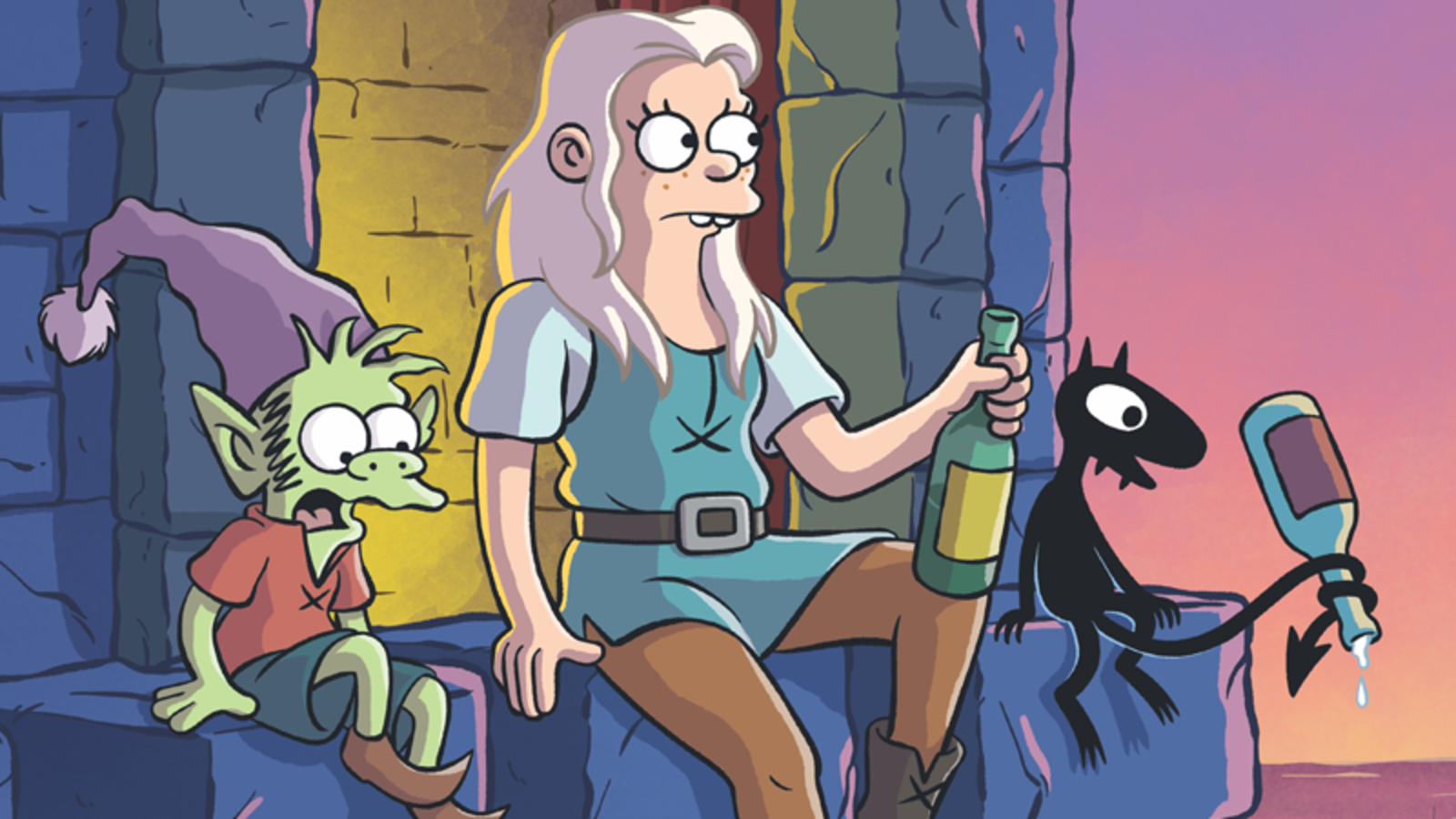
DISENCHANTMENT — Netflix. ✭✭✩✩✩
Matt Groening’s very overrated. He created The Simpsons, sure, but he wasn’t the genius who turned it into one of the 1990s funniest TV shows… and, uh, what it’s become today. The Simpsons has aired 639 episodes so far, and Groening has written four of them. The most recent one on 1996. FOUR episodes. In the last 22 years. And yes, he created the wonderful Futurama. But again, he was hardly the mastermind who turned that show into a cult favourite. He wrote two episodes of the 140 they produced. TWO. At best, Groening’s a half-decent ‘ideas man’ and has a style of artistry that became very distinctive. He seems like a nice guy, too. Maybe he knows his name gets fun ideas off the ground, for his friends to have fun turning into something special. I should cut him some slack. Go, Groening!
Anyway, Groening has now created Disenchantment for Netflix — maybe because he knows anything network TV gets its hands on these days is destined for cancellation because there’s less appetite to let shows naturally build an audience with commercial space at stake.
His new cartoon pokes fun at the tropes of high fantasy fiction in mediavel-style settings. It concerns alcoholic Princess Bean (Abbi Jacobsen) who flees her kingdom before an arranged marriage, her personal demon Luci (Eric Andre), and a green elf called Elfo (Nat Faxon). The animation style matches that of Groening’s other two shows but looks worse somehow. I’m not sure why. The establishing shots created digitally are beautiful, but everything else looks a bit too… basic and clean? There’s something a bit off about it, anyway. More alarmingly, I really don’t like the character designs. Bean’s okay as a bucktoothed Simpsons-y plucky woman, but Luci is a boring black two-dimensional silhouette, and Elfo’s something a ten-year-old might draw.
I hear this cartoon gets better and funnier as it goes along, but Futurama was more immediately engaging in terms of the clever gags, winsome characterisations, and distinctive look to everyone. Disenchantment feels weak to me; like seeing a malformed idea rushed into existence. But maybe it’ll find its feet as Groening’s influence is reduced and other writers grab it by the scruff of the neck. But you’ll never fix those character designs now. Eeesh.

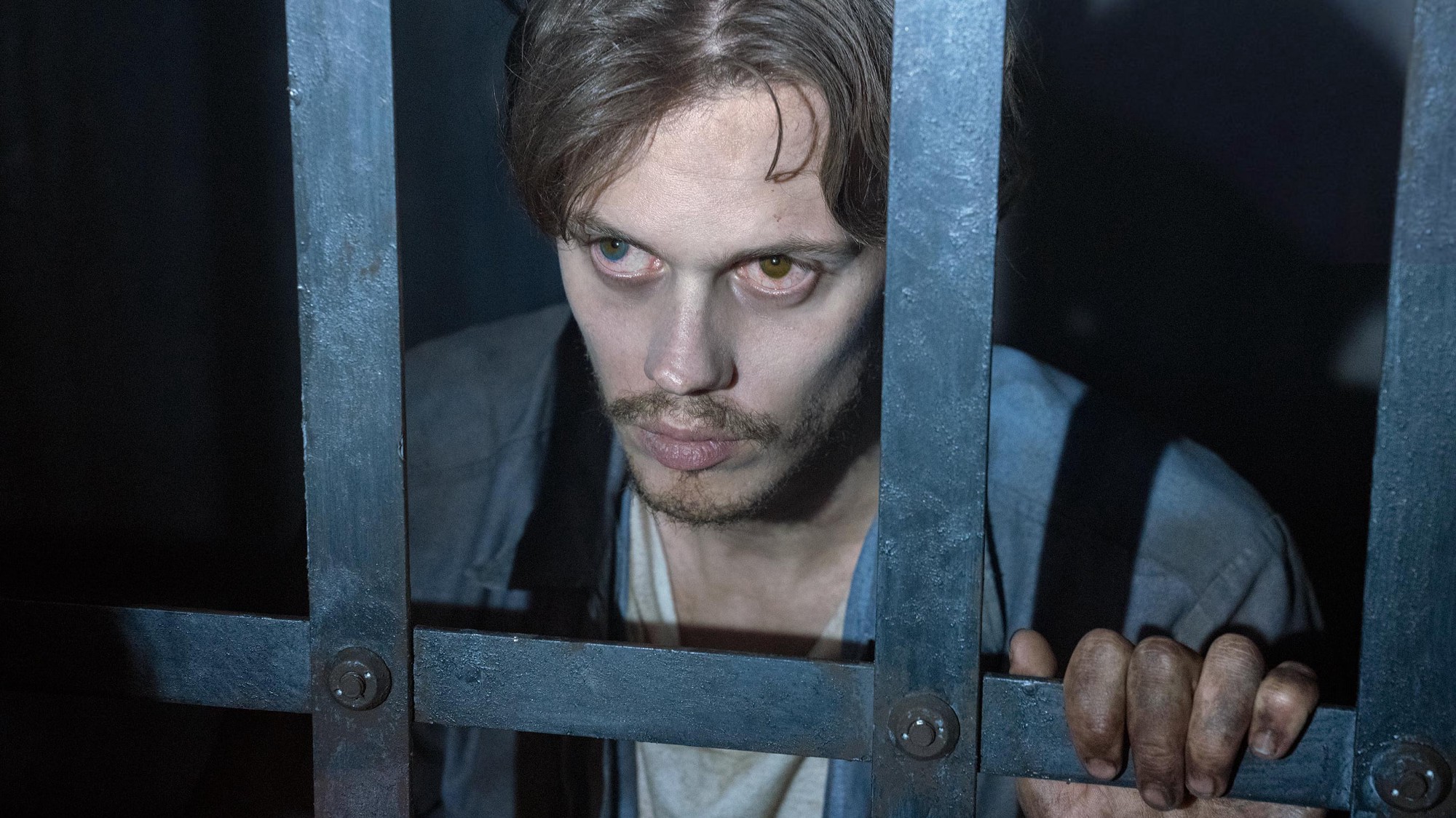
CASTLE ROCK — Hulu ✭✭✭✭✩
Hollywood’s plundering of lucrative IP continues, but with enough of a twist that Castle Rock escapes too much cynicism. Created by Sam Shaw and Dustin Thomason, Hulu’s new psychological horror series is more loose inspiration than straightforward adaptation. Stephen King is an author who’s sold more than 350 million copies over his long career, with many of his stories taking place in fictional towns across the state of Maine where he lives. Castle Rock was one of many places King dreamed up, first mentioned in The Dead Zone (1979), and it’s now the setting for a mystery drama that wants to imagine the “universe” King created is very real… but tell a new story set there, nodding to characters and events we’ve already read about.
Castle Rock doesn’t follow any of King’s own plots, so it’s a show that’s its own own thing, but somehow familiar because of various “easter eggs” referencing King’s work and a tone evoking the best of the various movie adaptations. The first episode, “Severance”, introduces Castle Rock’s characters and their relationships, while slowly revealing the mysteries that’ll shape the season.
As such, the following synopsis of what Castle Rock’s about might be considered SPOILERS if you’ve yet to watch a single instalment: we follow Henry Matthew Deaver (André Holland), a criminal law attorney in Texas who specialises in capital punishment cases. Henry grew up in Castle Rock, and was himself the focus of a mystery after going missing for 11 days in 1991, before being found by then-Sheriff Alan Pangborn (a character from Needful Things, played by Scott Glenn) in the middle of a frozen lake.
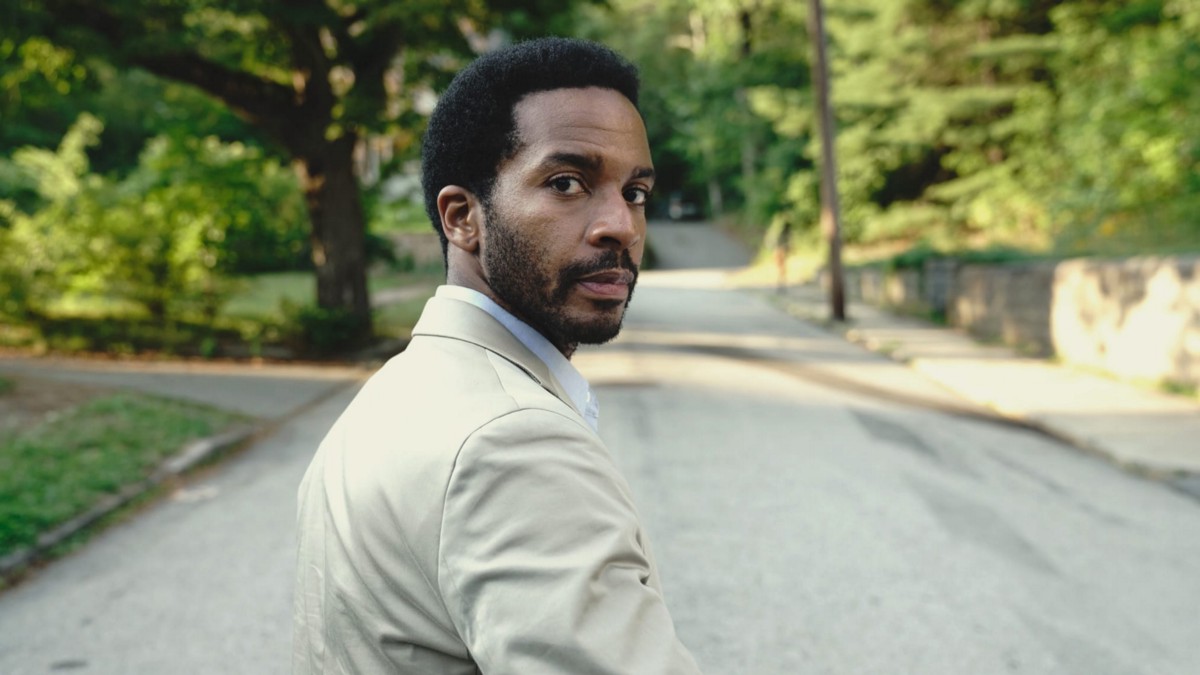
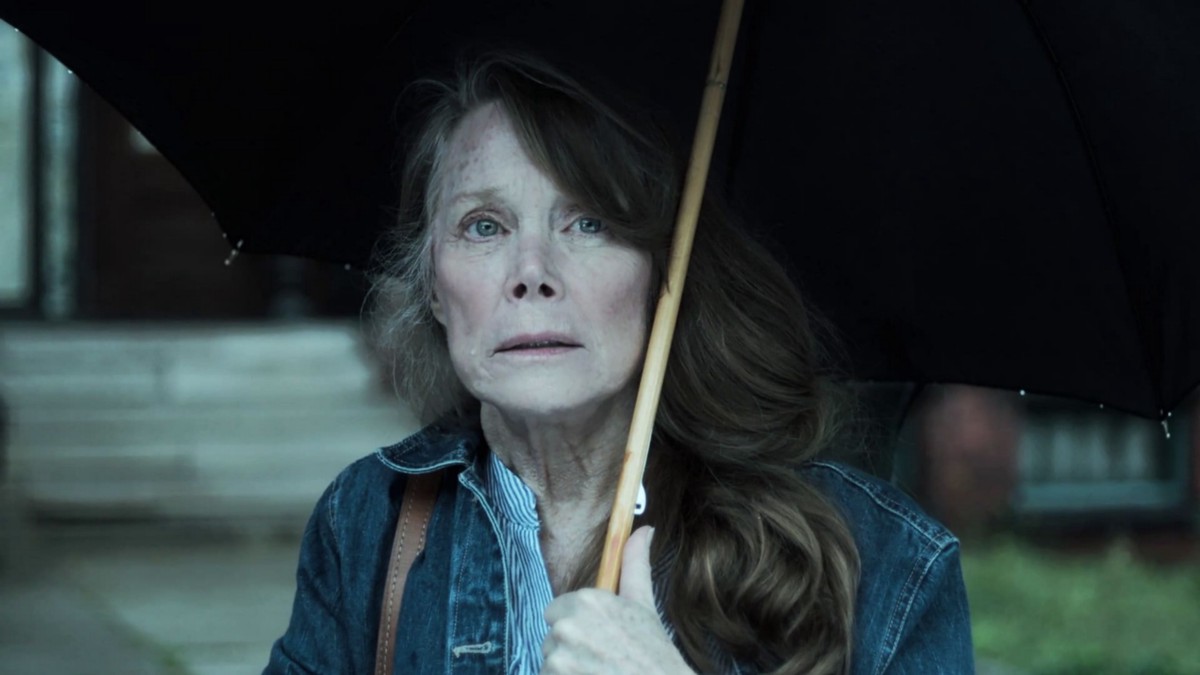
Unfortunately, Henry was blamed for the death of his adoptive father, who was discovered frozen and with a broken back during the search, so became an outcast around town. It’s no wonder he left Castle Rock as an adult and headed to the Lone Star state, where even representing Death Row clients was better than being given side eye by gossiping neighbours.
Only now, adult Henry’s been dragged back to Castle Rock after taking a cryptic phone call from a prison guard working at Shawshank State Penitentiary (yes, the same place Andy Dufresne escaped from in Frank Darabont’s classic movie). The caller informs Henry that a mysterious stranger’s been discovered inside a cage at the bottom of a hole in a disused wing of the prison, and “The Kid” (It’s Bill Skarsgård) has asked for Henry by name. Weirdly, this discover was only made days after Shawshank’s warden Dale Lacy (Lost’s Terry O’Quinn) committed suicide by driving his car off a bluff into the same lake young Henry was found.
- Are all of these events connected somehow?
- Where did Henry go when he went missing as a boy, and how did he survive in -2F temperatures?
- Did he kill his father as everyone thought? If not, who is the killer and are they still at large?
- Why was The Kid being kept inside a metal cage by a creepy warden?
- And why did said warden commit suicide, shortly after apparently setting in motion The Kid’s discovery?
Those are a lot of questions after just one episode, marking Castle Rock out as another of those “puzzle-box mystery shows”. It’s no surprise that Bad Robot Productions produce the series, with J.J Abrams as an executive producer. Abrams made his name selling high-concept TV shows in the early-2000s, often built around enigmas and intrigue. Alias and Lost being prime examples.
There’s also a lot of Stephen King-esque characterisations and kooky ideas floating around Abrams’ oeuvre, while King himself was a vocal and passionate fan of Lost, so Castle Rock seems like the perfect meeting of minds.
King’s extensive back catalogue of Maine-set horror gives this drama a rich milieu to pull from, or characters to lift straight off the page, but then use in new ways inside a different story with a familiar vibe. The series largely takes place in and around Shawshank State Penitentiary, and the pilot in particular draws a lot from Darabont’s movie in terms of aesthetic and tone. Even the music is eerily similar, and it was no surprise to discover that Shawshank Redemption’s very own Thomas Newman is composing this show’s music alongside Chris Westlake.
I’ve seen the first six episodes of this, and it’s a good show. There are excellent actors involved, it weaves an atmospheric spell because of the performances, music and mysteriousness, and it feels like a dramatised Stephen King story — only it’s one you’ve never read before, because it’s really just professional fan-fiction.
Bizarrely, no UK broadcaster has snapped this up yet. It feels like a good fit for Channel 4, E4, Sky1, or Sky Atlantic. One assumes Hulu’s SVOD rivals in the US won’t be awarded the UK exclusive.

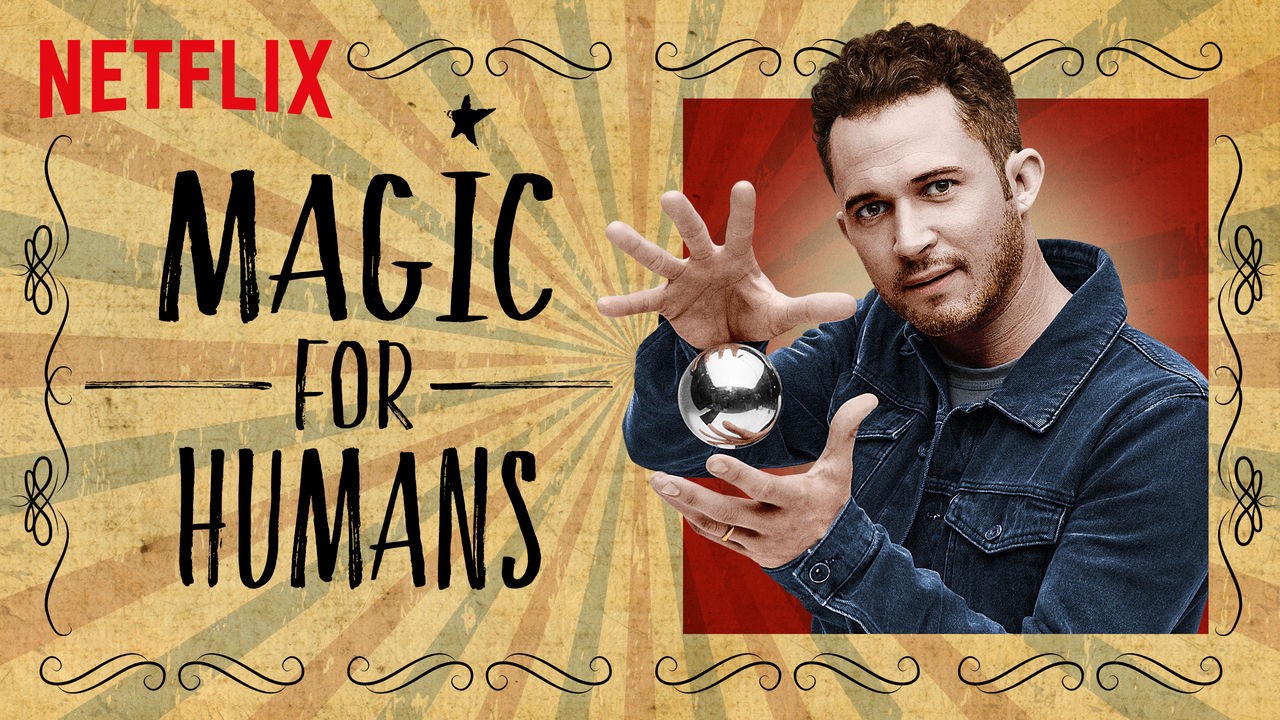
MAGIC FOR HUMANS — Netflix. ✭✭✭✭✩
This is just a little something I chanced upon: a funny magic show on Netflix, where illusionist Jason Willman (a Johnny Galecki soundalike) performs tricks on the public. It’s street magic, mentalism, all that stuff others have perfected for TV already (a combination of David Blaine, Dynamo and Derren Brown), but Willman’s a personable fella and many of his illusions are great fun and bewildering to see happen.
A few are so “impossible” one assumes editing trickery is at play — like when folk are asked to wear VR goggles and levitate off their seats! Surely they’re stooges, right? You’d feel the harness that’s clearly lifting you up on wires, because people can’t actually defy the law of gravity! But it’s nevertheless a very entertaining and easy six-part series to watch. One stunt involving making people think they’ve invisible was a complete joy, although some of the aforementioned “oddness” starts making you question how much of what you’re seeing’s is truthful in terms of how the tricks were experienced in real-time on the day. The jury’s out, but Magic for Humans is a very easy thing to binge one slow afternoon.

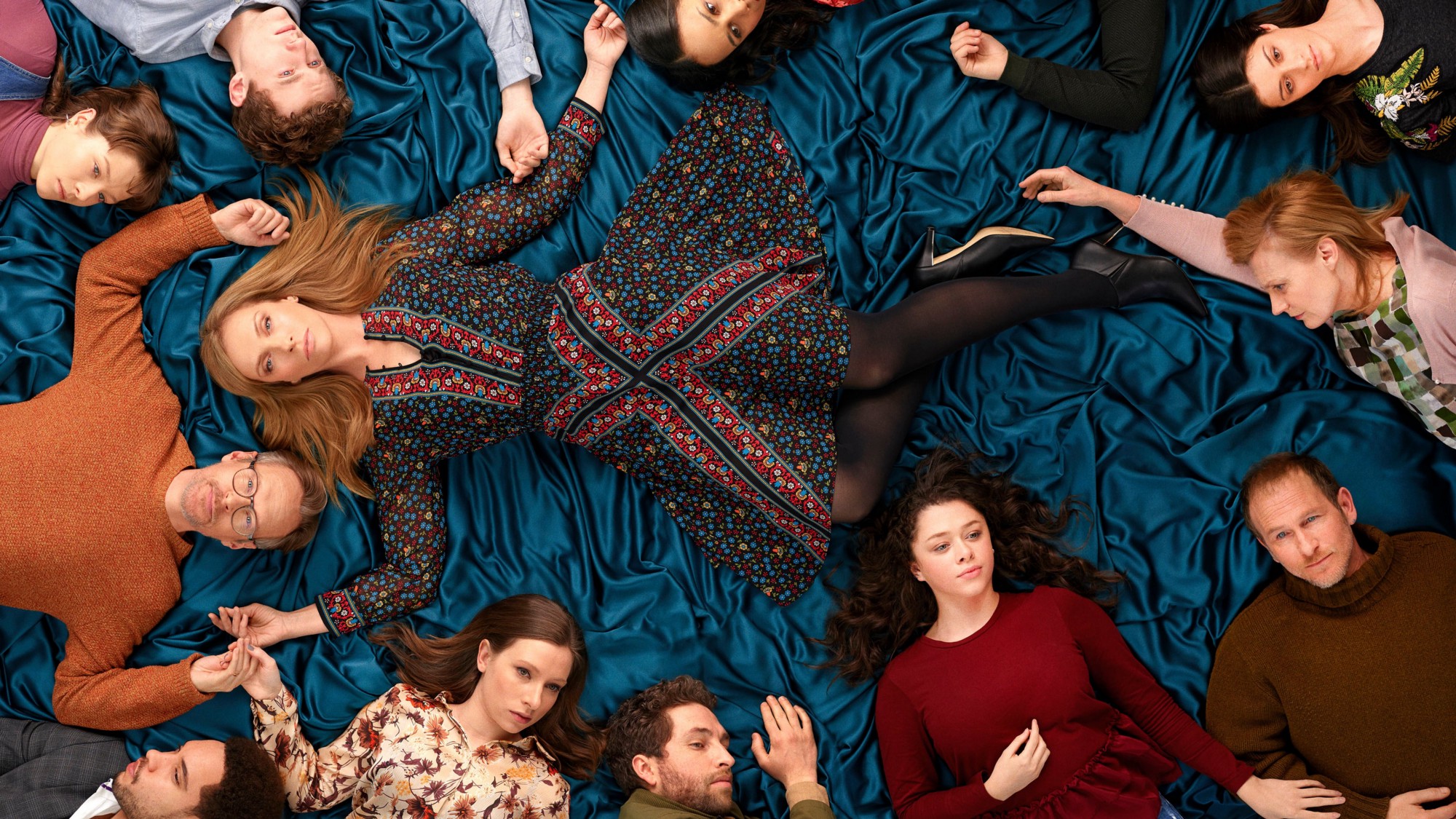
WANDERLUST — BBC1 ✭✭✭✩✩
This is a new BBC drama co-produced with Netflix (where it’ll be shown internationally), starring Toni Collette and Steven Mackintosh as a married couple whose sex life hits the rocks. So, to try and inject some passion back into their marriage, they agree to allow themselves the freedom to sleep with other people. And, lo and behold, this agreed infidelity puts the spice back into how they see each other. Funny that!
One selling point with Wanderlust is the presence of Aussie actress Toni Collette (The Sixth Sense, Hereditary), who isn’t exactly a Hollywood A-lister, but she’s famous enough to give this drama bit of extra appeal. British audiences, in particular, still probably rate Collette from Muriel’s Wedding (1994) and she does a perfect English accent. The other sellable aspect is how supposedly bold and daring for “a BBC drama” these episodes are, in terms of how the sex is portrayed and the kind of honest relationship dramas that unfold.
I think the latter point’s misleading marketing spin, as this is hardly a revolutionary TV show. Showtime’s Masters of Sex was three times as sexy and edgy with its content, and that’s just off the top of my head.
It’s written Nick Payne, adapting his own 2010 stage play, so maybe things had a certain frisson when being performed live right in front of you? There’s nothing graphic about Wanderlust’s sex scenes (which are usually tasteful closeups of facial reactions as something naughty happens below the waist, off-camera), and most viewers will have seen more arousing stuff elsewhere. Hey, we have the Internet! Your average 14-year-old’s seen things that’ll make their parent’s eyes bleed. Wanderlust is maybe a little “fruity” for your nana, if she happens to tune in.
Besides all that, is Wanderlust any good? Well, it’s okay. I don’t like how it seems to think its storyline is blazing a trail for how sex is portrayed on TV, because it’s just not. There are no envelopes being pushed or glass ceilings being smashed through, it’s just enjoyable fluff with a bit of lovemaking. Collette and Mackintosh are both good and likeable as Joy and Alan, and there’s fun support from the rest of the ensemble — particularly Zawe Ashton (Fresh Meat) as a young school teacher who becomes Alan’s bit on the side.
There are aspects of this show that don’t ring true, for me. Joy and Alan are very open about their sex life around their kids, who don’t seem to find it that embarrassing. Maybe it’s just how they’ve been brought up (Joy is a therapist), or the script needed them to accept certain things without kicking up a fuss to ensure the story has somewhere to go… but I had a hard time imagining teenagers not squirming with embarrassment if their mum and dad talked about sex around the dinner table, then later revealed they’re sleeping with other people. It didn’t strike me as a very British thing.
Wanderlust will be available internationally through Netflix soon, probably soon after it ends its run on BBC in three weeks. (Update: 19 October!)

… and what I’m NOT watching:
- The Bodyguard on BBC1. I wanted to first gauge what the buzz was before finding time for it, but when it turned out to be highly rated by friends and The Sun ruined two of is biggest surprises for me. So I felt less inclined to start watching.
- Jack Ryan on Amazon Prime. I just haven’t found the time, and heard enough disappointing things to make me me in less of a hurry to check it out.
- American Horror Story: Apocalypse. Well, the first episode wasn’t great, but it had some intriguing elements. I may watch a bit more when it starts in the UK, mostly because I’m curious to see how the Murder House and Coven ensembles mix together.
